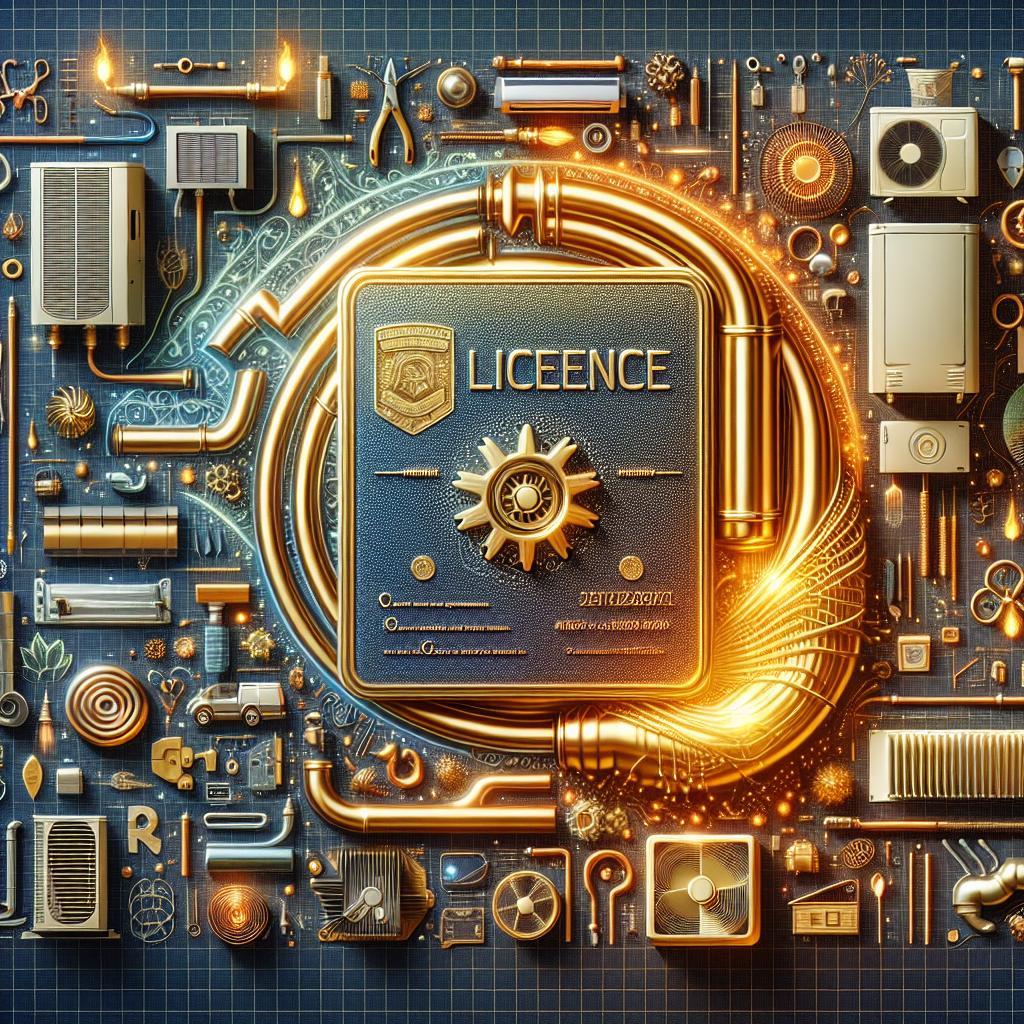Unlocking the Door to Comfort: A Guide to Obtaining Your HVAC License
As the world continues to heat up, both literally and figuratively, the demand for skilled heating, ventilation, and air conditioning (HVAC) technicians is soaring. The HVAC industry is not merely about maintaining climate control; it’s about ensuring comfort and safety in homes, offices, and public spaces. If you’re considering a career in this dynamic field, obtaining your HVAC license is a crucial step. This article will guide you through the essential steps to secure your HVAC license, from understanding the prerequisites and exploring various certification programs to preparing for exams and navigating state-specific regulations. Whether you’re a newcomer eager to dive in or a seasoned professional looking to formalize your expertise, this comprehensive guide is your roadmap to becoming a licensed HVAC technician and unlocking a world of career possibilities. Let’s get started on your journey to mastering the art of climate control!
Understanding the HVAC Licensing Process and Requirements
Obtaining an HVAC license is a crucial step for professionals in the heating, ventilation, and air conditioning industry. The licensing process varies significantly by state, so it’s imperative to familiarize yourself with your specific local regulations. Generally, to get licensed, you’ll need to meet certain prerequisites, such as a combination of educational qualifications and hands-on experience. Most states require aspiring HVAC technicians to complete a formal training program or apprenticeship that covers theoretical knowledge and practical skills.
After completing your training, the next step is to apply for your license. This often involves passing a comprehensive exam that assesses your knowledge of local codes, safety regulations, and technical proficiency. Common requirements may include:
- Proof of Education: Certificates or diplomas from accredited programs.
- Work Experience: Documentation of required hours under a licensed technician.
- Exam Passing Score: Proof of successful completion of licensing examinations.
Additionally, you might need to meet bonding and insurance requirements to protect your business and clients. Keeping abreast of ongoing education and renewing your license as per your state’s regulations is also crucial for maintaining compliance and staying competitive in the field.

Essential Skills and Training for Aspiring HVAC Professionals
To embark on a successful career in HVAC, aspiring professionals must acquire a range of essential skills and undergo appropriate training. Mastering the fundamentals of heating, ventilation, and air conditioning systems is crucial. This foundational knowledge can be developed through a combination of classroom instruction and hands-on experience where you can expect to learn:
- System Design: Understanding how various HVAC systems function and their design considerations.
- Electrical Knowledge: Gaining familiarity with electrical components, circuitry, and safe handling practices.
- Refrigeration Basics: Learning the principles of thermodynamics and how refrigeration cycles work.
- Problem-Solving Skills: Developing the ability to troubleshoot common HVAC issues effectively.
- Customer Service: Enhancing interpersonal skills to interact positively with clients and provide top-notch service.
Participating in accredited training programs—whether through vocational schools, community colleges, or apprenticeships—can significantly boost one’s qualifications. Many programs offer certification upon completion, which can increase job opportunities. Here’s a brief overview of training offerings:
| Training Type | Duration | Certification |
|---|---|---|
| Vocational Training | 6 months | CNC, EPA 608 |
| Community College | 1-2 years | Associate Degree |
| Apprenticeship | 3-5 years | Journeyman Certification |
As technology advances, HVAC professionals must engage in continuous learning to stay updated on new systems and technologies, ensuring they provide the highest level of expertise to handle evolving demands in the field.

Navigating Licensing Examinations: Tips for Success
Obtaining your HVAC license can seem like a daunting task, but with the right strategies, you can navigate the process smoothly. Start by familiarizing yourself with your state’s licensing requirements, which often vary significantly. Focus on understanding the types of licenses available, whether it’s a residential, commercial, or master HVAC license. Next, create a comprehensive study plan that incorporates reviewing key topics related to HVAC systems, codes, and regulations. This will not only bolster your knowledge but also instill confidence as you prepare for the examination. Utilize resources like online courses, textbooks, and practice exams to reinforce your understanding and identify areas where you may need additional focus.
When it comes to test day, a few preparation tips can make a crucial difference. On the day of the exam, ensure you have all necessary documentation with you, such as your identification and confirmation of registration. It’s also advisable to arrive early to give yourself time to relax and mentally prepare. During the exam, carefully read each question before answering and keep track of your time to ensure you finish. If you encounter a difficult question, don’t dwell on it; move on and return later if time permits. A prepared mind and a positive attitude can be your greatest assets. Consider the following tips to maximize your success:
- Practice with mock exams: Familiarize yourself with the format and type of questions that will be on the test.
- Join study groups: Collaborating with peers can enhance your learning experience.
- Manage your time effectively: Allocate time for each section of the exam to avoid rushing through questions.

Maintaining Your HVAC License: Continuing Education and Renewals
Maintaining an HVAC license is crucial for professionals in the industry to ensure they stay up-to-date with the latest technologies and regulations. Most states require ongoing education to keep your skills sharp and your knowledge relevant. Participating in continuing education courses not only enhances your capabilities but also demonstrates your commitment to safety and excellence. These courses often cover a variety of topics, including:
- New HVAC technologies
- Energy efficiency standards
- Local codes and regulations
- Safety practices
As you approach the end of your license term, it’s important to ensure that you complete any required hours of coursework to facilitate the renewal process. Many states provide flexible options for fulfilling these requirements, including online courses, in-person workshops, and even webinars. Check the relevant state board’s website for specific requirements and deadlines. This table summarizes some common requirements:
| State | Renewal Cycle (Years) | Required CE Hours |
|---|---|---|
| California | 2 | 16 |
| Texas | 2 | 8 |
| New York | 3 | 14 |
Q&A
Q&A: How to Get an HVAC License
Q1: What is an HVAC license, and why is it important?
A1: An HVAC license certifies that you are qualified to work with heating, ventilation, and air conditioning systems. This license ensures you possess the necessary knowledge and skills to install, repair, and maintain these systems safely and effectively. It’s important not only for legal compliance but also for building trust with your clients, demonstrating your expertise in a complex field.
Q2: What are the basic eligibility requirements to obtain an HVAC license?
A2: While requirements can vary by state or region, most places require candidates to be at least 18 years old, have a high school diploma or GED, and possess relevant work experience or vocational training. Some states also mandate an apprenticeship or completion of a formal HVAC program before you can apply for a license.
Q3: How can I gain the necessary experience for an HVAC license?
A3: The most effective way to gain experience is through an apprenticeship program, which will pair you with a seasoned HVAC technician. Typically lasting 3 to 5 years, this hands-on experience allows you to learn the trade while working on real-world HVAC systems. Alternatively, enrolling in a technical school can provide valuable knowledge and skills, often including internships.
Q4: What does the licensing process typically entail?
A4: The licensing process usually starts with completing a vocational training program or apprenticeship. Once you have the required experience, you’ll need to pass a written exam that tests your knowledge of HVAC systems, safety regulations, and local codes. Some states also require a practical exam. After passing, you’ll submit an application and any necessary fees to your local licensing board.
Q5: Are there different types of HVAC licenses?
A5: Yes, there are often multiple classifications of HVAC licenses depending on the scope of work you intend to perform. For instance, some states offer separate licenses for residential and commercial work, while others may have specialized licenses for refrigeration technicians. It’s crucial to research your state’s specific categories and regulations to determine which one you need.
Q6: How often do I need to renew my HVAC license?
A6: HVAC licenses typically require renewal every few years, with the frequency varying by state. During renewal, you may need to complete continuing education courses to stay updated on industry best practices and changing regulations. Keeping your skills sharp ensures you remain knowledgeable and compliant in a rapidly evolving field.
Q7: What resources are available to help me prepare for the HVAC licensing exam?
A7: A plethora of resources are at your disposal to prepare for the exam, including textbooks, online courses, study guides, and practice tests. Additionally, many technical schools offer review sessions or workshops designed specifically for exam preparation. Engaging in study groups or forums can also provide support and motivation as you prepare.
Q8: Are there any specific challenges I should be aware of while pursuing an HVAC license?
A8: Certainly! The process can be competitive, and the exam itself may be challenging. It’s essential to stay focused and dedicated throughout your training and preparation. Additionally, the HVAC field often requires physical stamina and problem-solving skills, which can be demanding but rewarding. A positive attitude and perseverance will serve you well on this journey.
Q9: Is obtaining an HVAC license worth the effort?
A9: Absolutely! An HVAC license not only opens doors to better job opportunities and higher earning potential but also enhances your credibility as a professional. This credential establishes you as a skilled tradesperson in high demand, especially with the growing emphasis on energy efficiency and environmentally friendly HVAC solutions. The effort invested in obtaining your license can lead to a fulfilling career.
Q10: What is the next step after obtaining my HVAC license?
A10: Once you have your HVAC license, you can begin to seek employment with HVAC companies, start your own business, or further specialize in areas like eco-friendly or smart HVAC technologies. Network within the industry, stay informed about regulations and trends, and consider joining professional organizations to enhance your career opportunities. Your licensed journey has only just begun!
Insights and Conclusions
obtaining an HVAC license is not just a gateway to a rewarding career; it’s a commitment to professionalism and excellence in an ever-evolving industry. Whether you’re drawn to the hands-on nature of the work, the challenge of mastering complex systems, or the satisfaction of providing comfort to others, the journey begins with understanding the requirements and dedication to your craft. As you embark on this path, remember that each step – from coursework to exams and practical experience – is an investment in your future. Embrace the learning process, connect with mentors, and adhere to the standards set forth by your local licensing boards. With perseverance and passion, you’ll not only earn your license but also lay the foundation for a lifetime of opportunities in the HVAC field. The future is cool, and with your new skills, you’ll be ready to tackle it head-on. Happy heating and cooling!

